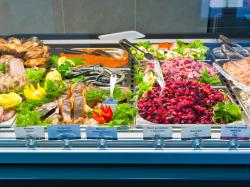Deli Prepared Foods Lead Departments Increasing Share Of Fresh
April 25, 2011 | 2 min to read

CHICAGO – New research from the Perishables Group reveals the in-store deli is gaining share of perishables sales, driven by deli-prepared foods.
The information was released in the Perishables Group’s new Deli Department Drivers report, which combines point-of-sale supermarket data, consumer demographic profiles, shopper loyalty card data and secondary research to determine the most important factors impacting department performance.
Fresh department sales, including produce, deli, bakery, seafood and meat, comprised a growing percentage of total store sales in recent years. In 2010, the deli led all fresh departments in sales growth, increasing both dollar and volume sales by 4.5 percent.
According to the report, 94 percent of consumers purchased from the in-store deli last year and nearly one-third of those purchases contained multiple deli items; this rate of multiple purchases was higher than any other fresh department except produce.
Growth in deli-prepared foods continued despite some consumers returning to restaurants. Eighty-four percent of households purchased deli-prepared foods in the past year. Deli entrees and deli-prepared chicken both increased dollar and volume sales by double digits.
The report also attributes a portion of the deli’s success to growing assortment that better meets the needs of a diverse consumer base. For example, between 2005 and 2010, the number of deli cheese flavors increased by 56.8 percent, while new ethnic and spicy flavors drove growth in deli meat.
Additionally, the number of low-sodium deli meat items grew by 22 percent in the past year, catering to a more health-conscious demographic.
“The growing variety of meal options, flavors and health attributes will increase competition for shelf space in the deli,” said Bruce Axtman, Perishables Group president and CEO. “The key to continued success will be to know the consumer demographic for a given store, and tailor assortment so it best fits the needs of that consumer group.”
For more information or to purchase the Perishables Group Department Drivers reports, e-mail kellib@perishablesgroup.com or call 773.929.7013.
About the Perishables Group
The Perishables Group is a Chicago-based consulting firm focused on creating innovation and value for clients in the fresh food industry. Perishables Group expertise includes consumer research, analytics, marketing communications, category development, supply chain management and activity-based costing.
Source: The Perishables Group
